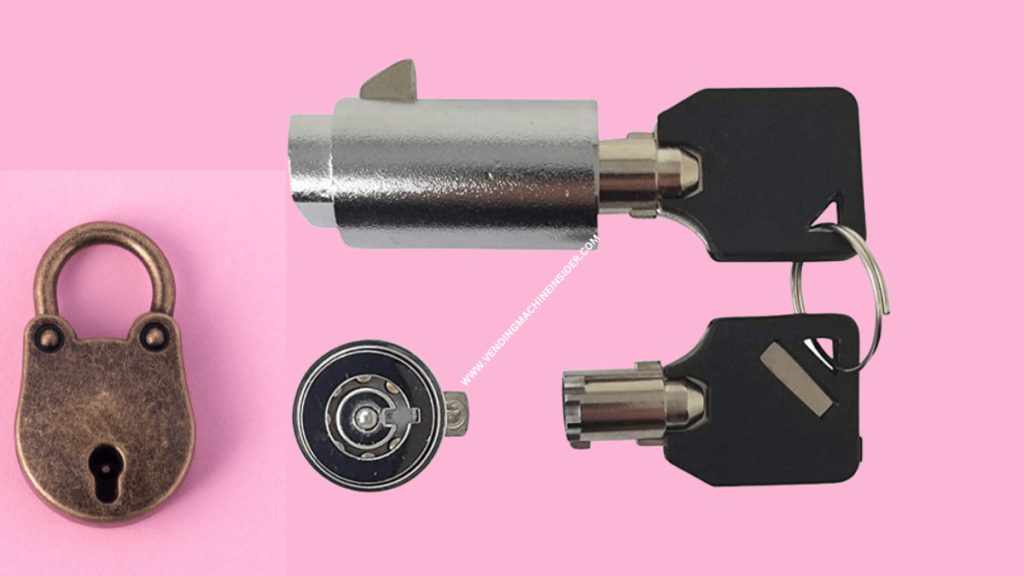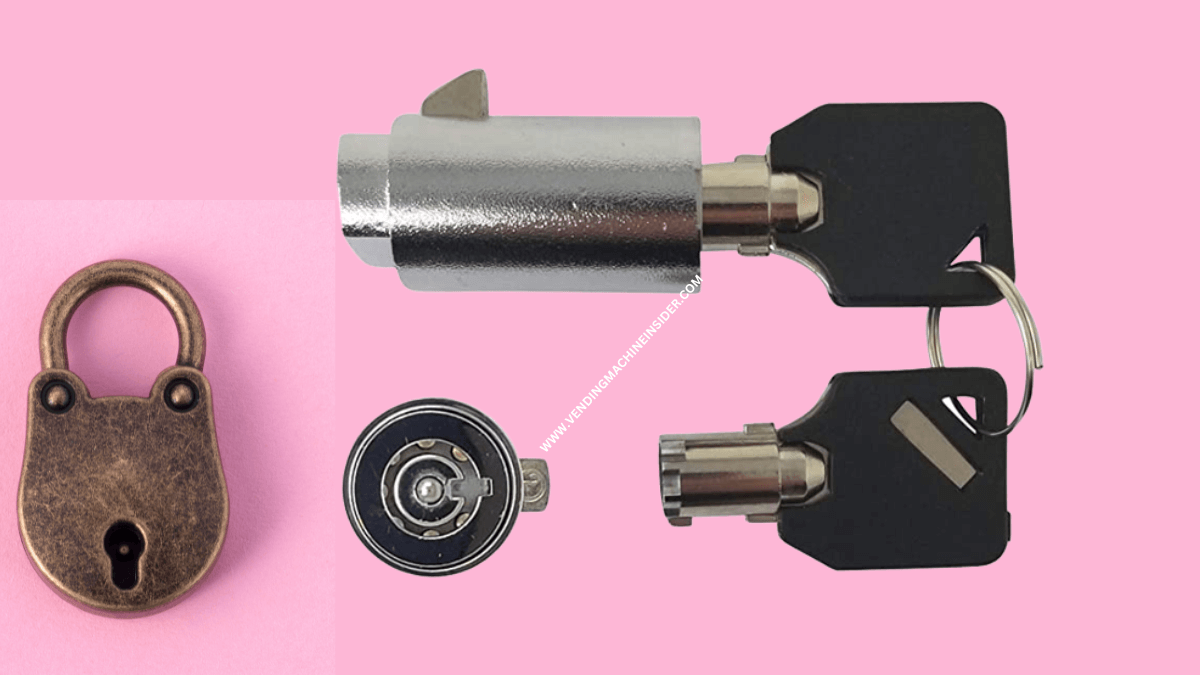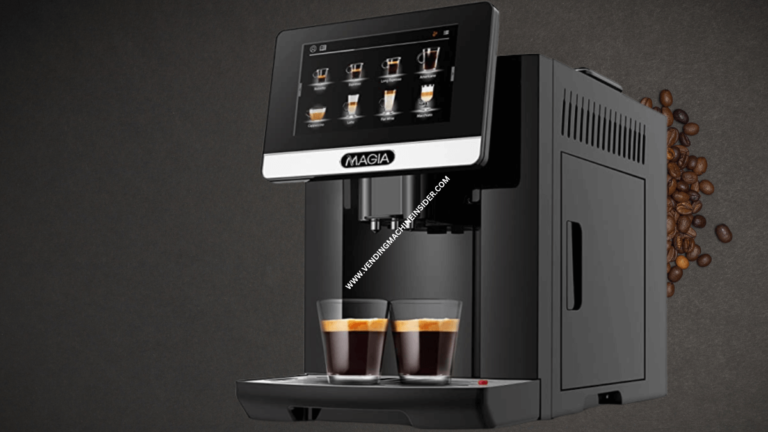How to Install Vending Machine Lock: Step-by-Step Tutorial
Trying to keep your vending machines in your office or building secure?
If so, you know the importance of having reliable vending machine locks.
Let’s explore the world of vending machine locks and what you should consider when choosing the right one for your needs.

Can Vending Machine Locks be Replaced?
Yes, vending machine locks can be replaced. Replacing a lock is relatively easy, and is done by following a few simple steps.
Materials Needed for Installing Vending Machine Locks
When installing vending machine locks, you will need a variety of materials including
- Lock kit (should include lock, key, and mounting hardware)
- Drill with drill bits
- Screwdriver
- Wrench
- Measuring tape
- Marker or pen
- Safety glasses
Depending on the type of lock chosen, additional components may also be necessary such as mounting brackets or springs.
It is important to ensure that all components are compatible with the selected lock before proceeding with the installation.
How to Install Vending Machine Locks
Here’s a detailed guide on how to install locks in vending machines:
Step 1: Choose the Right Lock Kit
Choosing the right lock kit for your vending machine is essential for a successful installation.
Make sure that the chosen lock kit is compatible with your existing locking mechanism and matches the type of vending machine you have.
Step 2: Remove the Old Locking Mechanism
Use a screwdriver or wrench to remove and loosen the screws that hold the old lock in place.
Clean up around the hole where the new lock will be installed once it is removed.
Step 3: Measure and Mark the Hole
Measure and mark the diameter of the hole where you will be installing your new lock, using a measuring tape and marker or pen.
This will ensure correct positioning during installation.
Step 4: Drill the Hole
Drill a hole in the marked spot, using a drill bit that matches that of your new lock’s diameter.
Make sure to wear safety glasses to protect yourself from debris while drilling.
Avoid drilling too deep or wide, as this can damage your vending machine.
Step 5: Install The Lock
Insert your new lock into its designated hole and secure it with the mounting hardware provided within your lock kit.
Check that it is aligned correctly, then tighten it securely.
Step 6: Test The Lock
Test out your new lock by inserting a key and turning it to make sure it opens and closes correctly.
Should any problems occur during testing, adjust accordingly until the functioning properly.
Step 7: Final Check
Finally, check through all components of your new vending machine addressing any loose screws or parts before testing out its overall functionality one last time; including testing out your newly implemented lock again!
How to Reset a Vending Machine Lock Code
Resetting a vending machine lock code is usually done when the old code has been forgotten or misplaced.
It can be easily done by following the steps outlined below.
Step 1: Locate the Key Slot
The first step is to locate the key slot on the outside of the vending machine.
This is where you will insert your new key, or reset key, to change the lock code.
Step 2: Insert Reset Key and Turn Clockwise
Once you have found the reset key slot, insert your reset key and turn it clockwise.
It will allow you to access the internal lock mechanism of your vending machine and create a new lock code.
Step 3: Create New Lock Code
With your reset key still inserted into the vending machine, enter your desired four-digit combination for your new lock code.
After entering the combination, rotate your reset key counter-clockwise until it clicks back into place to set your new code.
Step 4: Test New Lock Code
Now that you have created a new lock code, test it out by using any standard flathead screwdriver or coin as a “key” to open up the vending machine door.
Enter your new four-digit combination and make sure that it opens properly before completing this step.
Step 5: Enjoy Your New Lock Code!
You’re now done with resetting your vending machine lock code!
If all went well then you’ll now have a working new lock code for secure access to whatever contents may lie inside!
Types of Locks Used on Vending Machines
There are several different types of vending machine locks available on the market today that offer varying levels of security and access restriction.
The most commonly used locks include:
1. Biometric Fingerprint Readers
For optimal security, biometric fingerprint readers can be used to restrict access to only authorized users.
2. Proximity Card Readers
Offering a convenient way to restrict access to certain locations or areas, proximity card readers are a popular choice for securing vending machines.
3. Keypad Locks
Allowing users to enter a code or combination in order to unlock the vending machine, keypad locks provide an added layer of security.
4. Swipe Card Readers
As an even more secure alternative than keypad and proximity card reader options, swipe card readers act as an effective way to control access.
What is the Best Vending Machine Lock for Security?
Below are some of the most popular options:
| Lock Type | Pros | Cons | Recommended for |
|---|---|---|---|
| Medeco Locks | High security and durability | Expensive | High-risk locations and valuable machines |
| Abloy Protec2 | High resistance to picking and drilling | Expensive | High-risk locations and valuable machines |
| Tubular Locks | Affordable and widely available | Can be easily picked or bumped | Low-risk locations with low-value machines |
| Electronic Locks | Programmable and easy to use | Vulnerable to hacking and power outages | High-traffic locations with a range of products |
| Padlocks | Affordable and easy to replace | Can be easily cut with bolt cutters | Low-risk locations with low-value machines |
How to Detect Tampering With a Vending Machine Lock
1. Inspect the lock itself for any physical signs of tampering, such as scratches or alterations.
2. If you have an electronic lock, check the access logs to see if anyone has attempted to bypass the authentication process.
3. Check for signs of vibration or other suspicious activity near the vending machine.
4. Bring in an expert to conduct a full inspection of the machine’s security system and verify that everything is functioning correctly.
Conclusion
Locks on vending machines serve an important function in ensuring the security of the product inside.
They come in a variety of styles and designs, including padlocks, electronic locks, and specialized high-security solutions.
It is important to regularly inspect locks on vending machines for signs of tampering or wear-and-tear and to remember that only authorized personnel should have access to the contents.
Also Read: How to Replace a Vending Machine Lock? Step-by-Step Guide






